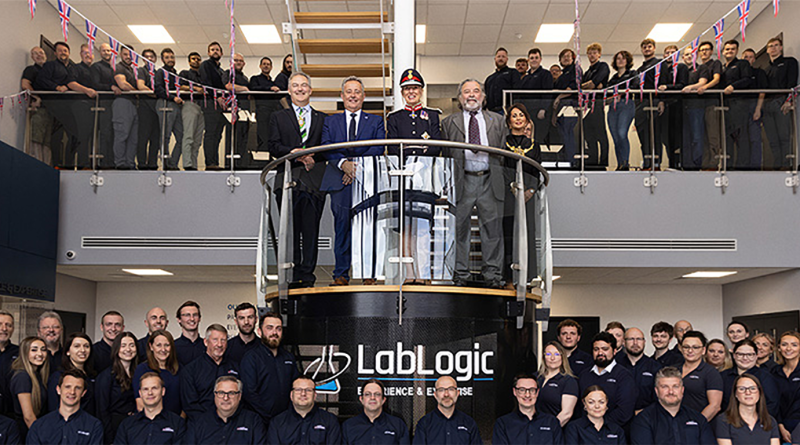Richard Brown Discusses How LabLogic Systems’ Theranostics and Radiation Safety Solutions are Driving Progress in Cancer Research
Specializing in the detection and measurement of radioactivity, LabLogic Systems (LabLogic) plays a vital role in the life science, nuclear medicine – notably Positron Emission Tomography (PET) – and radiation safety sectors, for which it manufactures instrumentation and software. With over 40 years’ experience in providing solutions within highly regulated environments, many of LabLogic’s solutions are the industry standard. The organization caters to a wide range of customers, including 18 of the top 20 pharmaceutical companies, leading PET tracer manufacturers, and world-renowned universities.
“LabLogic is one of several companies gathered under the LabLogic Group Holdings umbrella. Aside from LabLogic, the group comprises Southern Scientific, Knight Imaging, and Care Wise, as well as LabLogic’s American, French, and German branches. The group originally started with LabLogic, which was established in our founder’s bedroom in Sheffield in 1980. To this day, we are still based in Sheffield and privately owned,” begins Richard Brown, Managing Director and CEO.
“Over the years, we have experienced steady growth and expanded into export markets, to the point where we now sell to over 100 countries through our offices in the UK, US, France, and Germany. While each of the group’s brands focuses on a different market sector, the overall focus across the group is on radiation detection and measurement in highly regulated environments. This can include pharmaceutical drug development, nuclear medicine, cancer surgery, research, industrial and nuclear power stations, but it could also be military, security forces, police, and fire brigades,” he goes on.
Turning specifically to LabLogic’s UK branch, Richard details the production services it provides. “Essentially, we offer hardware and software that measure radioactivity in different types of samples for various application areas, but primarily in pharmaceutical research and nuclear medicine. Approximately 50 percent of our business is software solutions that manage the process, instruments, and machinery and perform various functions that traditionally people needed to do with scientific data, to automate processes and analysis to improve efficiency and reduce opportunities for the introduction of errors. We also deliver a range of consumables and accessories associated with the fields we operate within. Given that these are highly regulated environments, we provide extensive service and support, including training and aftercare, and ensure that our instrumentation has the annual qualifications required to perform to the agreed standards.
“Another key specialty of ours is what we call validation services. To operate in highly regulated environments, companies must undergo validation to make sure that their instruments and software are fit for purpose, and we can assist them in getting individual sites up and running through our validation services. Furthermore, we develop new instrumentation and conduct R&D projects. This is particularly relevant in nuclear medicine, where many new technologies and techniques are emerging. We are also working on cancer research and creating new instrumentation to help with cancer diagnosis and treatments,” he expands.
Cancer research is a key area of focus at LabLogic at the moment. Richard shares insights into the company’s work and objectives in the field. “For the past 15 years, we have been heavily invested in PET, a specific aspect of nuclear medicine. PET is particularly useful in the detection of cancer, as it provides a full body image. Not only does PET allow oncologists to diagnose the presence of cancer early on (thereby offering better chances of remissions), but it also enables them to evaluate the extent of the cancer’s spread in the body. Prior to carrying out a PET scan, a radioactive drug (known as a tracer) must be injected into the body. The tracer must undergo a variety of quality control (QC) checks before it is allowed to be used, and we have developed a significant portion of the hardware and software used in this process.”
Striving to stay ahead of industry research and developments, LabLogic is becoming increasingly involved in an up-and-coming medical concept. “Beyond PET, the next big thing in the field is theranostics, which combine diagnostics and therapy. Radioactivity has been used for many years to diagnose various diseases via scans, but in fields like radiotherapy, it can be used to attack various diseases and kill cancer cells. However, radioactivity can also have negative effects on the body. As a result, the industry is working on theranostics by developing specific types of radioactive materials that can target diseases without causing collateral damage. Thanks to our reputation, we have been approached by various institutions around the world to partner with them on research in theranostics. For instance, we are working with the University of York on a funded Knowledge Transfer Project (KTP) involving targeted alpha therapies (TAT). Additionally, King’s College London has asked us to collaborate on a similar project through the Engineering and Physical Sciences Research Council, and we are part of a large European consortium to develop QC techniques and associated technology for these novel materials over the next five years. Overall, I believe that aside from the markets we are already strong in, theranostics presents a significant potential growth area for us,” Richard enlightens.
In closing our conversation, Richard reveals the factors contributing to LabLogic’s 21 percent increase in its annual turnover since 2023. “I believe it was partly driven by the marketplace’s continued confidence in our products. Although the pharmaceutical industry is vast, drug development and nuclear medicine are niche markets. By being in those markets for so long and working for the same type of clients over the years, we have instilled a high level of trust in our company. We do not merely sell products to our customers; we are partners who help them develop the next generation of products they may need,” he ends.
